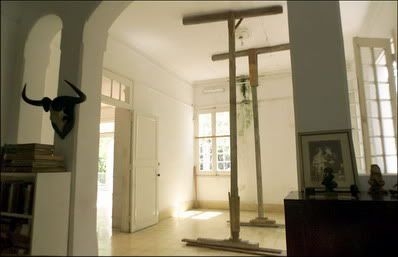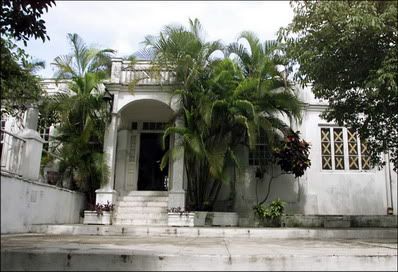By GINGER THOMPSON
The New York Times
SAN FRANCISCO DE PAULA, Cuba - Ernest Hemingway's work made him a citizen of the world. But he made this tiny community of artisans on the outskirts of Havana his only real home. Now caretakers are fighting to keep his country villa, set high on a hill looking out to the sea, just the way he left it four decades ago.
It is, as expected, a decidedly masculine place, cluttered with books about war and hunting - the library contains about 9,000 volumes - and decorated with African animal trophies and bullfight posters. The bar is stocked with rum and Cinzano bottles. There's a Glenn Miller album on the record player. The table is set for guests.
But in what architects describe as a preservation emergency, the house, known as Finca Vigía or Lookout Farm, is tumbling down. An effort to save the finca, an American cultural treasure and an important Cuban tourist attraction, seems threatened by a storm of politics.
Nature has been hostile to the house over the years, experts say, with rain and creeping vegetation penetrating the walls and the foundation. The roof leaks, the walls are turning green with mold, the floors are buckling and termites are devouring the wooden frame. The bedroom where Hemingway wrote some of his greatest works, including "The Old Man and the Sea," is so close to collapsing that its furniture has been moved into storage.
"We have cared for this house with great affection for many years, because we Cubans consider Hemingway one of ours," said Gladys Rodriguez, president of the Hemingway International Institute of Journalism in Havana and one of the principal caretakers of the author's legacy in Cuba.
"We will keep doing all that we can," she said. "But we cannot deny that we need help. This museum legally belongs to Cuba, but morally it pertains to the United States."

A group of American preservationists, architects and Hemingway biographers offered to come to the rescue earlier this year. The Hemingway Preservation Foundation applied for a license that would exempt it from the United States' 40-year-old economic embargo against Cuba and allow it to provide money and expertise to help restore the finca. The foundation, led by Frank and Jenny Phillips, estimates that the project would cost $2 million to $3 million.
The Bush administration denied the foundation's request in June, saying its project would support tourism and thus help the economy of the hemisphere's last Communist outpost. The request came at a time of increasing tension between the two countries. In March 2003 the Bush administration announced new restrictions on travel and cash transfers to Cuba, saying that the measures were aimed at weakening Fidel Castro's 45-year grip on the island and at opening the way for democracy.
Molly Millerwise, a spokeswoman for the Office of Foreign Assets Control at the Treasury Department, which administers the embargo against Cuba, said, "We do not want to facilitate something that puts dollars into Castro's hands."
Ms. Millerwise said she could not discuss the details of individual licensing decisions. But broadly, she said, Assets Control has licensed numerous projects that provide humanitarian assistance, including food and medicine, and that support religious outreach, and academic and cultural exchanges.
In fact, two years ago, it approved a license request by the Hemingway Preservation Foundation to save a trove of papers and photographs stored in Hemingway's basement at the finca. Hemingway biographers say the papers - including early drafts of major works, a copy of the screenplay for "The Old Man and the Sea" with notes scribbled in the margins, letters from people including Ingrid Bergman and the editor Maxwell Perkins, and recipes - promise to shed light on a part of the author's life that Cuba has kept locked away like a state secret.
Under the agreement between the United States and Cuba, the documents are being repaired and preserved, and copies will be sent to the Hemingway collection in the John F. Kennedy Library in Boston. But sending American money to help save Hemingway's house, Ms. Millerwise said, is a different matter. She said the embargo expressly prohibits the United States from supporting "travel-related or tourism-related projects that generate money for the Cuban economy." Saving precious documents is legal, she says. Saving a tourist attraction is not.
Thomas D. Herman, a specialist in international law who represents the Hemingway Preservation Foundation, said the government's denial reflects a "narrow interpretation of the law." The finca is much more than a tourist attraction, he said. It is an invaluable part of America's heritage. The foundation plans to appeal the Treasury Department's decision later this month, though it may not receive a ruling before next month's presidential elections, Mr. Herman said. But the finca cannot wait. "The next hurricane could do irreparable damage," he said. "Time is of the essence to save Finca Vigía."
Leland D. Cott, the chief architect on the project, agreed. "I am not going to make any judgments about whether Castro is good or bad," said Mr. Cott, of Bruner-Cott & Associates in Boston. "My concern is that there is an important artifact rotting in the jungle, and it needs to be saved."
"The Cuban government is not going to last forever, and we need to look at the long-term," he added. "We could look back on this 20 years from now and realize we lost a important part of our heritage because of some political fight."
Finca Vigía, a breezy country house set on 15 sloping acres of mango, avocado and ceiba trees, is widely considered the place where Hemingway put down the deepest roots. The biographer A. E. Hotchner said Hemingway had no spiritual connection to the house in Ketchum, Idaho, where he spent the last two years of his life struggling against depression. And the house where he lived in Key West, Fla., contains only a few of his belongings and little of his history.

Cubans have kept Hemingway's memory alive. Four decades after he left Cuba, there are still people who can remember him sitting in their kitchens for coffee, dancing at their weddings. They have made small shrines of his favorite room at the Ambos Mundos Hotel, his favorite bar stool at La Floridita and his favorite table at La Terraza. And the Cuban government gave Hemingway's first mate, Gregorio Fuentes, a free meal at La Terraza every day until he died in 2002, at 104.
Hemingway bought Finca Vigía, built by a Spanish architect in the late 1800's, in 1939 for about $18,500. In the cool early mornings, writing while standing in his leather moccasins, he produced "For Whom the Bell Tolls" and manuscripts that would be published posthumously, including "A Moveable Feast" and "Islands in the Stream."
Keepsakes scattered through the big, airy rooms tell stories that seem larger than life. The war correspondent uniforms in the closet recall Hemingway's coverage of World War II. There's a sculpture by Picasso and an engraved bowl from President Franklin D. Roosevelt. There are copies of photographs of triumphant deep-sea fishing expeditions and of drunken pool parties with Ava Gardner and Errol Flynn. There is a photograph from the day he won the Nobel Prize.
There are also rare glimpses of the private obsessions of a literary celebrity. Hemingway's bathroom seems like some jungle laboratory, with a jar of lion lard for soothing sunburned skin next to a lizard that he preserved in a jar of formaldehyde because of its brave, although suicidal, fight against one of the author's more than 50 cats. And on the walls, there are his daily notes recording his weight and blood pressure. The last scribble, Ms. Rodriguez says, is from March 6, 1960. Hemingway left Cuba around then, and after stops in New York and Madrid, he bought the house in Ketchum. Relatives have said he was shattered by the American-backed invasion at the Bay of Pigs in 1961, because it meant that he could not go back to the home he loved. He committed suicide almost three months later.
His Cuban house stands as a kind of undisturbed tomb. Most visitors are allowed only to peek through the doors and windows. Ms. Rodriguez allowed a rare walk inside. "We want visitors to feel like the owner of the house could walk in at any moment and offer them a drink," she said. "It is not only his writing that makes Hemingway immortal. So does this house."
Copyright 2004 The New York Times Company 









